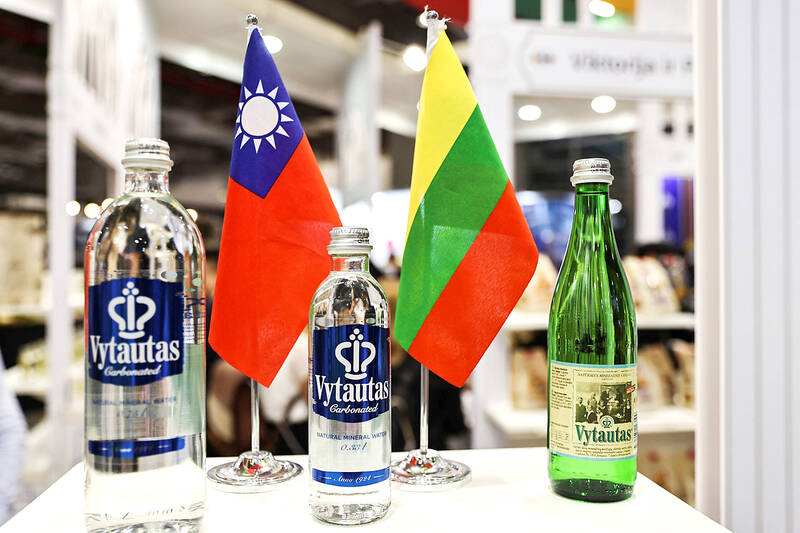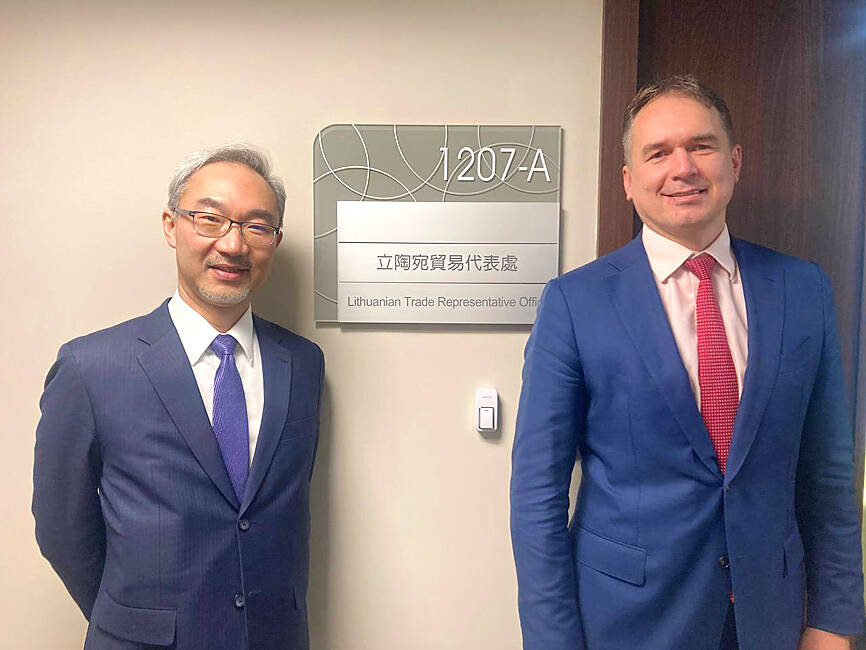Lithuania yesterday opened a trade office in Taiwan, potentially escalating tensions with China that have been simmering since the EU member state drew a stiff rebuke from Beijing.
The trade office’s opening comes a year after the government in Taipei opened an office in Lithuania’s capital, Vilnius. China responded by downgrading diplomatic relations with the Baltic state over the office’s explicit use of the name Taiwan.
The new Lithuanian trade office carries the name Taipei, which might avoid a harsher reaction from Beijing.

Photo: Ann Wang, Reuters
“Today we can rejoice over the first achievements of Lithuanian cooperation with Taiwan,” Lithuanian Minister of the Economy and Innovation Ausrine Armonaite said in a statement. “I have no doubt that our work with this promising market will intensify further after the opening of the Lithuanian trade office in Taipei.”
The dispute between China and Lithuania, a Baltic nation of 2.8 million, has helped roil relations between the world’s most populous nation and the EU as a whole.
After Taiwan’s trade office opened, China withdrew its ambassador and faced accusations of halting the clearance of Lithuanian goods in its ports. The standoff prompted the EU to raise the issue of trade hurdles with the WTO.

Photo courtesy of the Ministry of Foreign Affairs
Lithuanian President Gitanas Nauseda last month said China’s punitive action and its backing of Russia’s invasion of Ukraine showed that Beijing is the EU’s “systemic rival.”
Meanwhile, British Minister of State for Trade Policy Greg Hands held talks with Taiwanese officials in Taipei to “future-proof” Britain’s economy in the coming decades, as British Prime Minister Rishi Sunak’s administration looks to take a tougher stance on China.
After exports to China effectively stalled, Lithuania compensated for its losses by increasing its sales to 10 other markets in the Indo-Pacific region by 60 percent in the first eight months of the year, the Lithuanian Ministry of Economy said.
Taiwan yesterday also announced its first 3.5 million euro (US$3.49 million) investment in Lithuania’s ultra-fast laser technology producer Litilit.
Two more investments in Lithuania are to be announced later this year or by early next year to bring the total to 10 million euros, officials in Taipei said.
The Litilit investment was the first made by Taiwan’s US$200 million Central and Eastern Europe Investment fund, set up after Lithuania allowed Taiwan to open a de facto embassy on its soil in November last year.
The fund focuses on Lithuania, Slovakia and the Czech Republic.
Taiwan, the world's biggest supplier of semiconductors, will invest more than 10 million euros towards chip production in Lithuania, the head of the Taiwanese representative office in Vilnius said yesterday.
The Industrial Technology and Research Institute (工業技術研究院) will cooperate with Lithuania's electronics manufacturer Teltonika to build semiconductor technology capabilities in the Baltic country, Representative to Lithuania Eric Huang (黃鈞耀) said.
Over two dozen Taiwanese scholarships for Lithuanians will be offered for technical training, he added.
"This is not a transaction (in exchange of Lithuania allowing opening of the office)," Huang said. "It is because Taiwan would like to work with Lithuania together to strengthen the resilience of our democratic supply chain in the face of coercion by autocracies."
Earlier this year, Taiwan launched a 200-million-euro equity investment fund and a 1-billion-euro loan facility for Lithuania and other central and eastern European countries.
The first equity investments totaling 10 million euros in Lithuanian would be completed by early next year, said Huang, adding that first loans amounting to 9 million euros should be dispersed by the end of this month.
Taiwan also granted import permits for Lithuanian diary, fish and egg products, and could allow imports of its beef by the end of the year.
Additional reporting by Reuters

EARLY TALKS: Measures under consideration include convincing allies to match US curbs, further restricting exports of AI chips or GPUs, and blocking Chinese investments US President Donald Trump’s administration is sketching out tougher versions of US semiconductor curbs and pressuring key allies to escalate their restrictions on China’s chip industry, an early indication the new US president plans to expand efforts that began under former US president Joe Biden to limit Beijing’s technological prowess. Trump officials recently met with their Japanese and Dutch counterparts about restricting Tokyo Electron Ltd and ASML Holding NV engineers from maintaining semiconductor gear in China, people familiar with the matter said. The aim, which was also a priority for Biden, is to see key allies match China curbs the US

The popular Taiwan Semiconductor Manufacturing Co (TSMC, 台積電) arbitrage trade might soon see a change in dynamics that could affect the trading of the US listing versus the local one. And for anyone who wants to monetize the elevated premium, Goldman Sachs Group Inc highlights potential trades. A note from the bank’s sales desk published on Friday said that demand for TSMC’s Taipei-traded stock could rise as Taiwan’s regulator is considering an amendment to local exchange-traded funds’ (ETFs) ownership. The changes, which could come in the first half of this year, could push up the current 30 percent single-stock weight limit

PROTECTION: The investigation, which takes aim at exporters such as Canada, Germany and Brazil, came days after Trump unveiled tariff hikes on steel and aluminum products US President Donald Trump on Saturday ordered a probe into potential tariffs on lumber imports — a move threatening to stoke trade tensions — while also pushing for a domestic supply boost. Trump signed an executive order instructing US Secretary of Commerce Howard Lutnick to begin an investigation “to determine the effects on the national security of imports of timber, lumber and their derivative products.” The study might result in new tariffs being imposed, which would pile on top of existing levies. The investigation takes aim at exporters like Canada, Germany and Brazil, with White House officials earlier accusing these economies of

Teleperformance SE, the largest call-center operator in the world, is rolling out an artificial intelligence (AI) system that softens English-speaking Indian workers’ accents in real time in a move the company claims would make them more understandable. The technology, called accent translation, coupled with background noise cancelation, is being deployed in call centers in India, where workers provide customer support to some of Teleperformance’s international clients. The company provides outsourced customer support and content moderation to global companies including Apple Inc, ByteDance Ltd’s (字節跳動) TikTok and Samsung Electronics Co Ltd. “When you have an Indian agent on the line, sometimes it’s hard